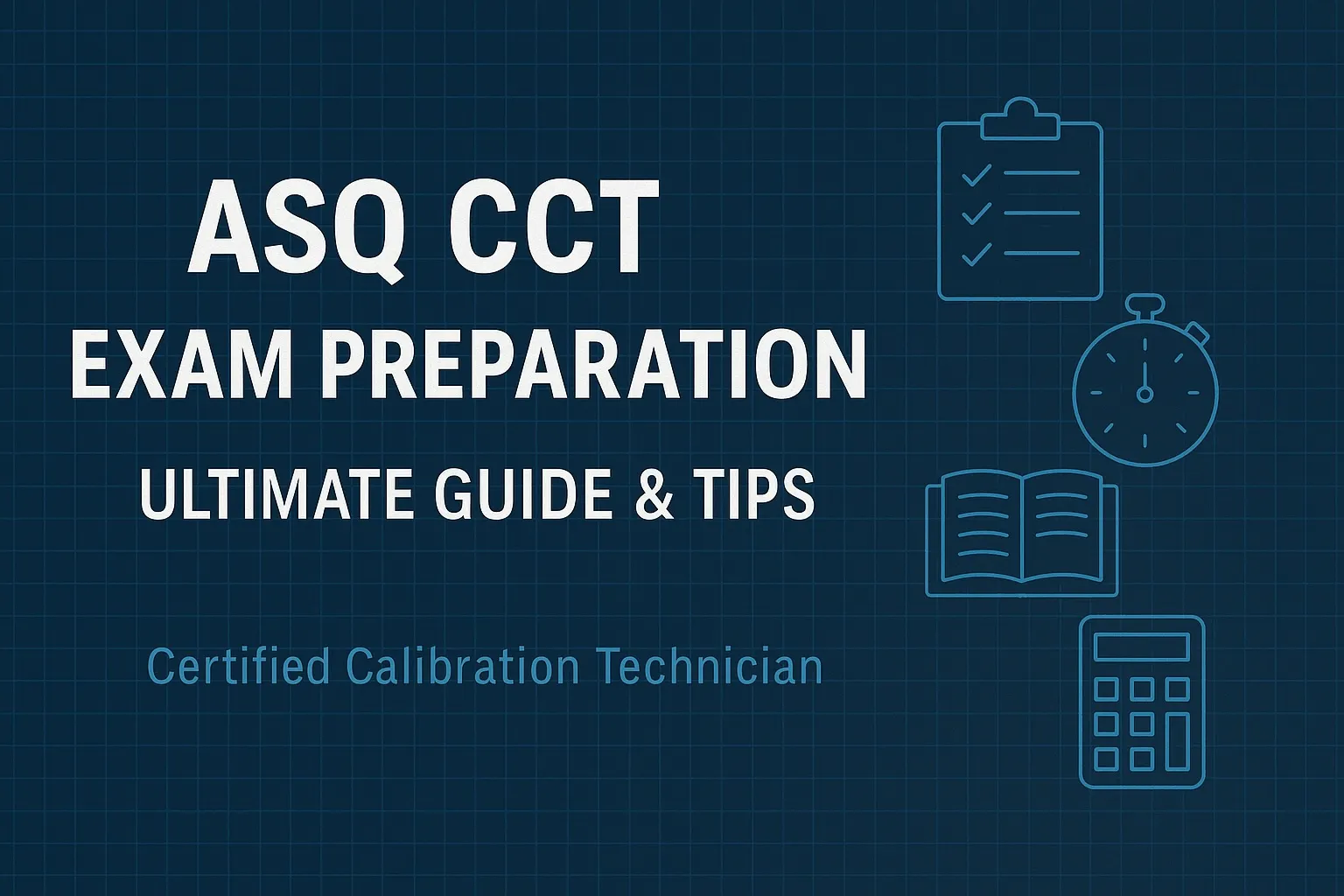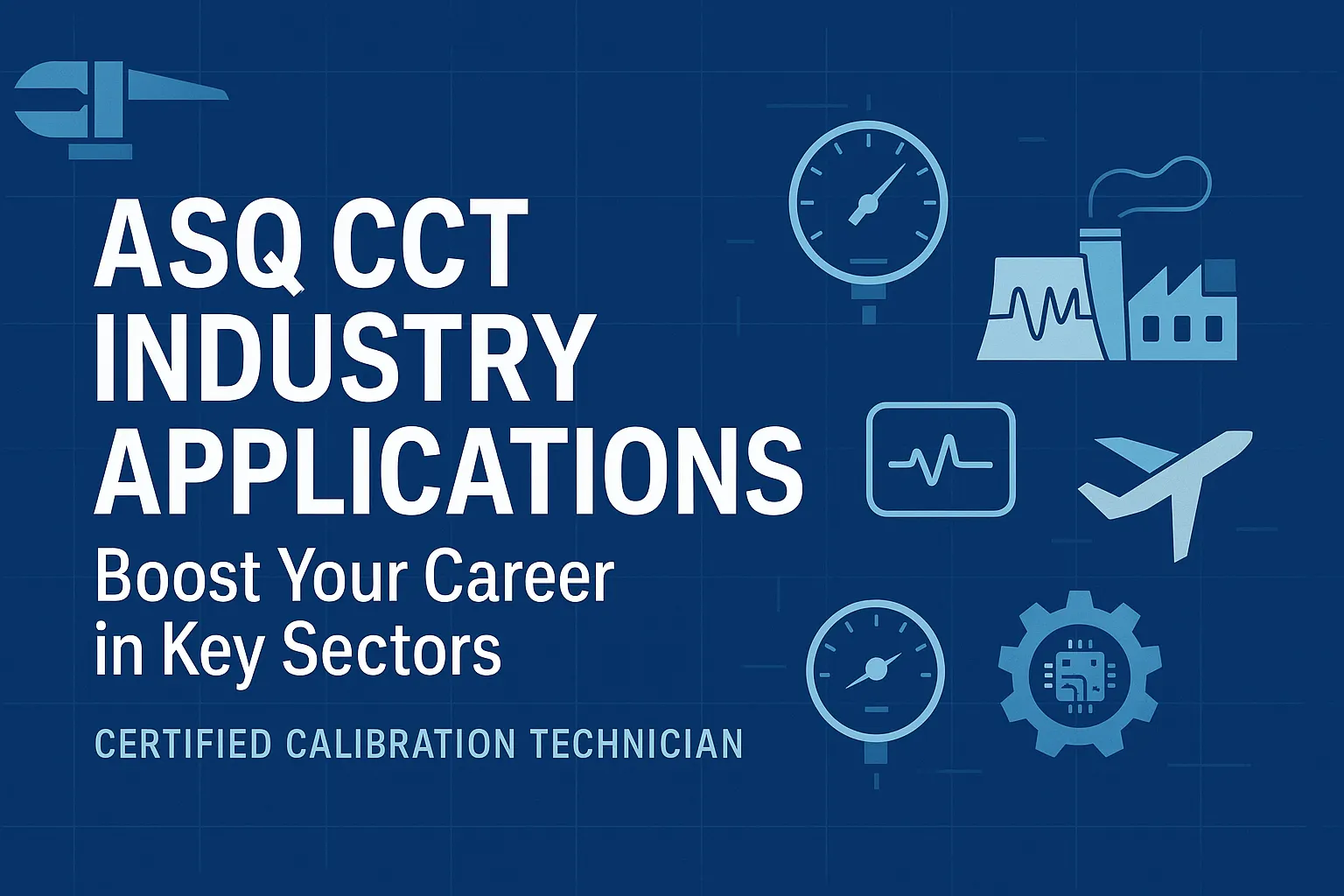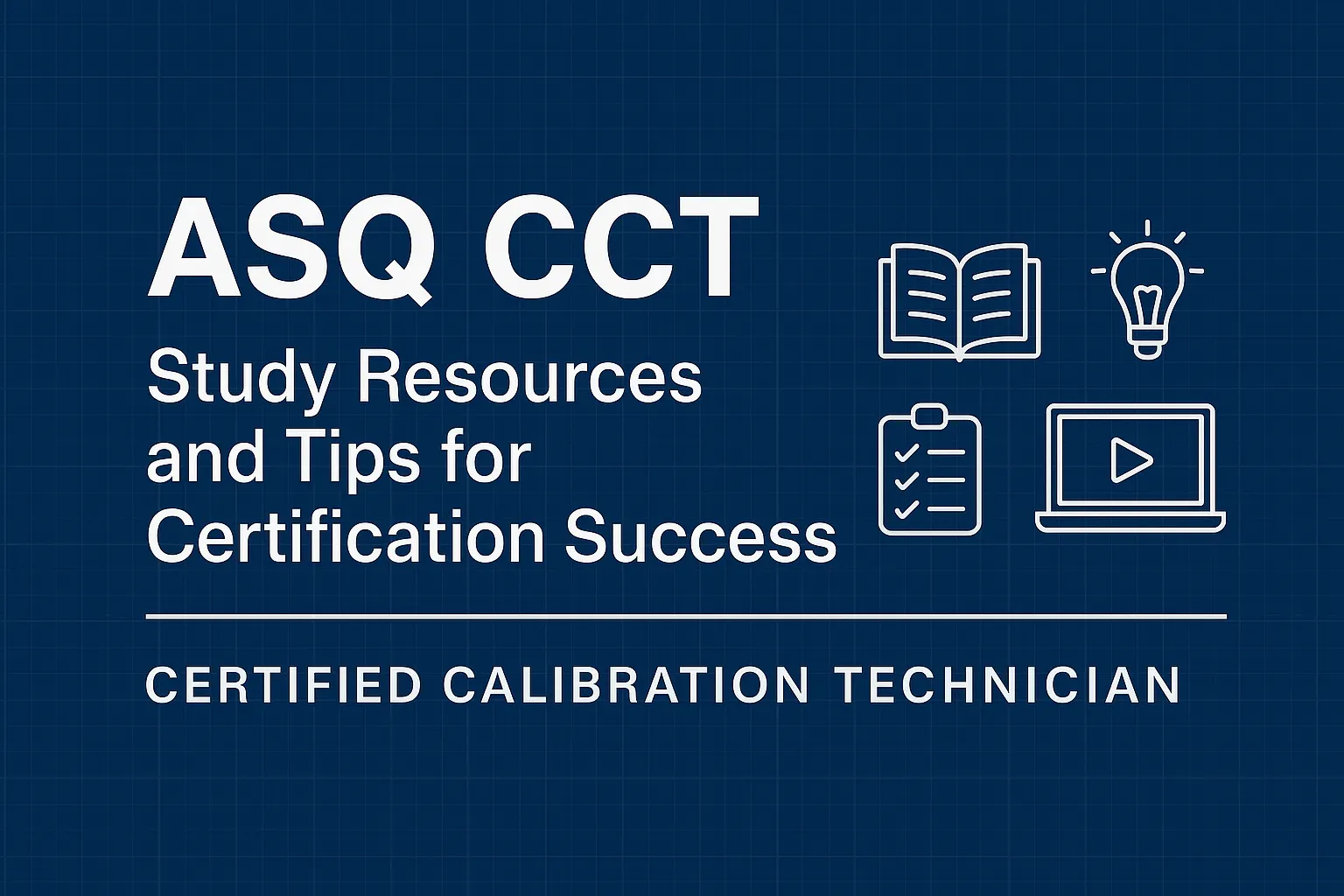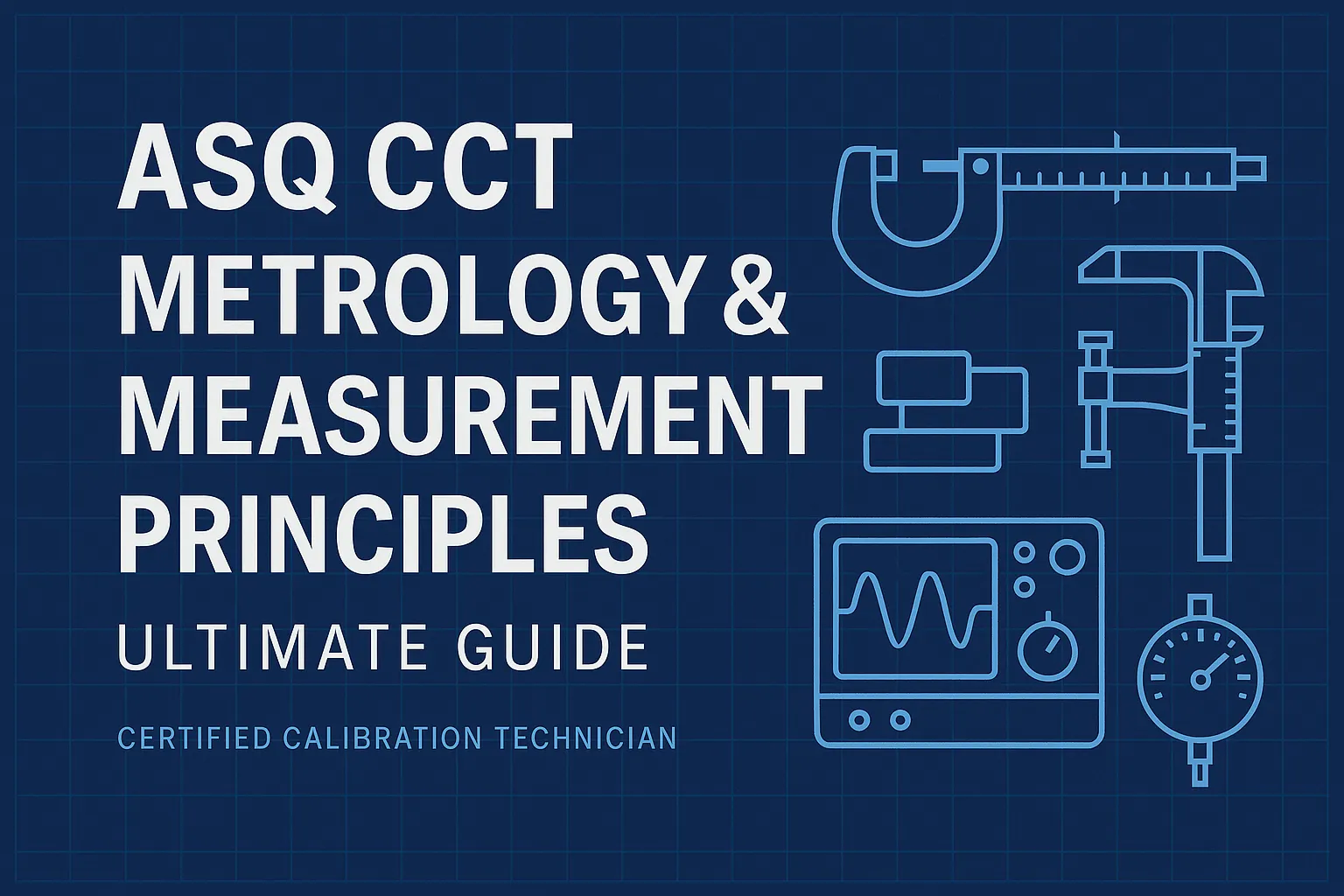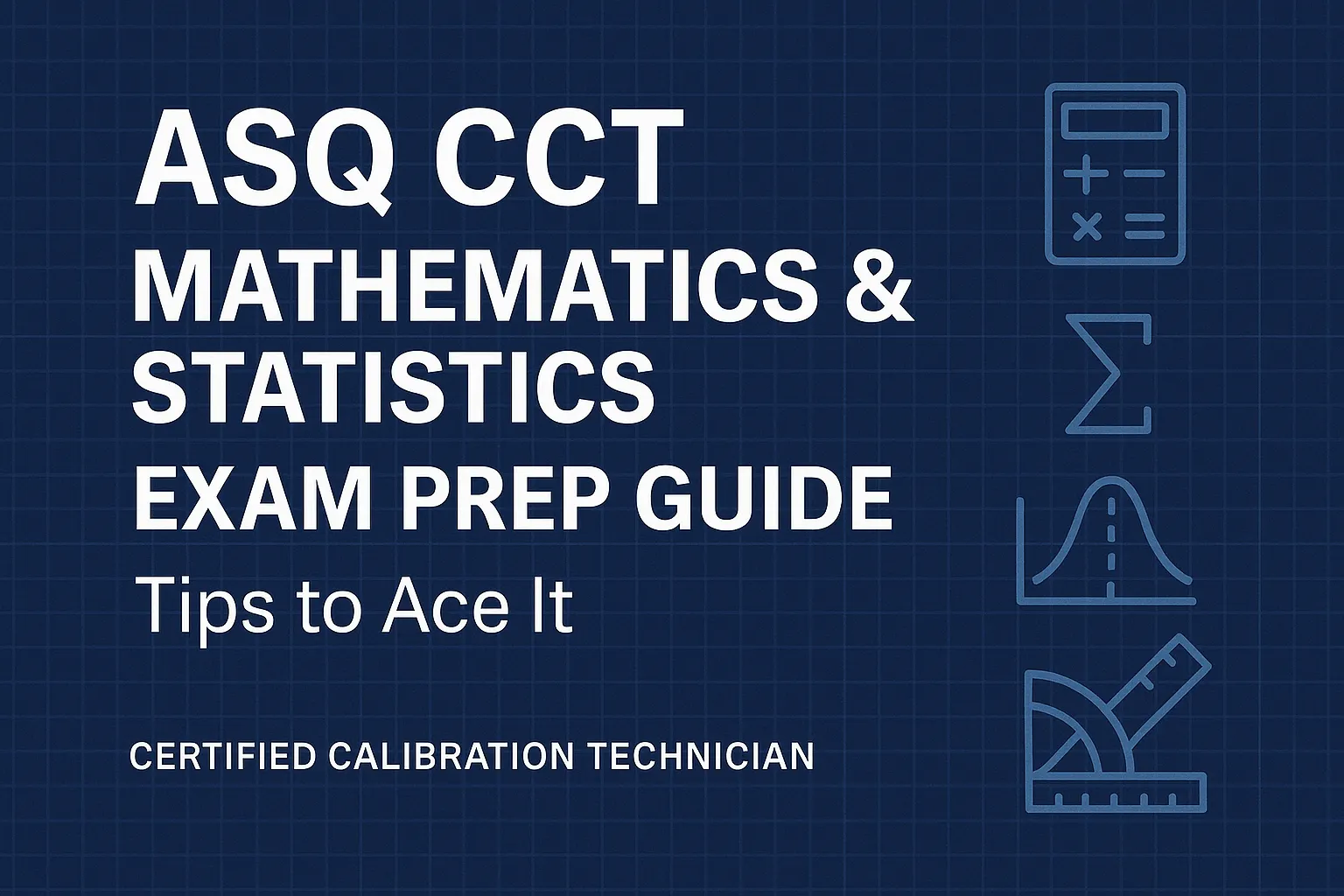ASQ CCT Metrology and Measurement Principles: Ultimate Guide
Imagine advancing your career in quality assurance by mastering the essentials of metrology and measurement principles through the ASQ CCT certification. You're stepping into a world where precision isn't just a skill—it's the foundation of reliable manufacturing and testing processes. As a Certified Calibration Technician, you'll gain the expertise to ensure instruments deliver accurate results every time, boosting your professional value in industries like aerospace, automotive, and healthcare.
You might wonder why metrology matters so much in today's fast-paced tech landscape. It's simple: accurate measurements prevent costly errors, maintain compliance with standards, and drive innovation. The ASQ CCT program equips you with core principles, from understanding uncertainty to calibrating complex tools, setting you up for success in a field that's always evolving.
Whether you're a technician eyeing certification or a manager seeking team training, diving into ASQ CCT opens doors to enhanced accuracy and efficiency. Let's explore how these principles can transform your approach to quality control.
Understanding ASQ CCT Certification
You gain a competitive edge in quality assurance by pursuing ASQ CCT certification. This credential focuses on metrology and measurement principles that ensure precision in your professional practices.
What is ASQ CCT?
ASQ CCT stands for American Society for Quality Certified Calibration Technician. You earn this certification to demonstrate expertise in calibrating instruments, understanding measurement uncertainty, and applying metrology principles. Professionals use it in industries like aerospace, automotive, and healthcare to maintain accurate measurements. The certification covers topics such as traceability, calibration standards, and error analysis, as outlined by ASQ's body of knowledge.
Eligibility and Requirements
You qualify for ASQ CCT with specific education and experience combinations. Candidates need at least five years of on-the-job experience in calibration or metrology if lacking formal education. You reduce this to three years with a technical diploma or two years with an associate degree. ASQ requires one year minimum in a decision-making role for all paths. Prepare by studying the CCT body of knowledge, which includes 125 exam questions on measurement principles and calibration techniques. Register through ASQ's website for the computer-based exam offered multiple times yearly.
Fundamentals of Metrology
You grasp the basics of metrology to excel in ASQ CCT certification. These foundations underpin accurate measurements in quality assurance across industries like aerospace and automotive.
Definition and Scope
Metrology defines the science of measurement. You apply it to ensure precision in calibrating instruments and tools. Its scope covers physical quantities such as length, mass, and time. Professionals use metrology in fields including manufacturing, healthcare, and research. You encounter metrology in everyday tasks like verifying gauges or sensors. The International Bureau of Weights and Measures (BIPM) establishes global standards for metrology practices.
Key Principles and Standards
Accuracy ensures measurements match true values. Precision guarantees consistent results across repeated trials. Traceability links measurements to international standards through calibration chains. Uncertainty quantifies potential errors in measurements.
You follow key standards to maintain quality. ISO 17025 specifies requirements for testing and calibration laboratories. NIST provides traceable references for U.S. measurements. BIPM oversees the International System of Units (SI) for global consistency.
Adopt these principles in your CCT preparation. They enhance your skills in error analysis and instrument calibration.
Essential Measurement Principles
You master essential measurement principles to excel in ASQ CCT certification. These principles form the core of metrology and ensure reliable calibrations in your quality assurance role.
Types of Measurements
You encounter direct measurements that involve straightforward readings from instruments like rulers or thermometers. Indirect measurements derive values from multiple direct inputs, such as calculating volume from length, width, and height dimensions. Contact measurements require physical interaction with the object, for example using calipers on a metal part. Non-contact measurements use sensors or lasers to assess properties without touching the item, like optical scanners in aerospace components. You apply these types in metrology tasks to maintain precision across industries including automotive and healthcare.
Accuracy, Precision, and Uncertainty
You achieve accuracy when your measurements closely match the true value, as defined by NIST standards. Precision ensures consistent results across repeated trials, even if they deviate from the actual value. Uncertainty quantifies the doubt in your measurement results, often expressed as a range like ±0.1 mm. You calculate uncertainty using ISO 17025 guidelines, which incorporate factors such as instrument resolution and environmental conditions. Traceability links your measurements to international standards from BIPM, enhancing reliability in CCT calibration processes.
Preparing for ASQ CCT Certification
You gain a competitive edge in quality assurance by preparing effectively for the ASQ CCT certification. This preparation builds on your understanding of metrology and measurement principles, enhancing skills in calibration and precision.
Study Resources and Strategies
Access official ASQ resources to master metrology and measurement principles for the CCT exam. Review the CCT Body of Knowledge (BoK), which covers 125 questions on topics like uncertainty calculation and instrument calibration, available on the ASQ website.
Enroll in ASQ-approved training courses that provide hands-on practice with calibration tools and traceability standards. These courses, offered online or in-person, align with ISO 17025 guidelines and include modules on accuracy and precision.
Purchase recommended books such as "The Metrology Handbook" by Jay L. Bucher, which details measurement uncertainty and error analysis. Supplement your study with NIST publications on traceability to link your knowledge to international metrology standards.
Develop a study plan that allocates 10-15 hours weekly over 3-6 months. Focus on weak areas like indirect measurements by practicing with sample questions from ASQ's practice exams.
Join study groups or forums on platforms like LinkedIn to discuss ASQ CCT topics with certified professionals. This interaction clarifies complex measurement principles and boosts your confidence in applying them.
Common Challenges and Tips
Candidates often struggle with calculating measurement uncertainty in metrology scenarios. Tackle this by practicing with real-world examples from ISO 17025, ensuring you quantify doubt accurately in your results.
Memorizing traceability chains to standards like those from NIST or BIPM presents another hurdle. Overcome it through flashcards that map instrument calibrations back to SI units, reinforcing your grasp on measurement principles.
Time management during the 4-hour CCT exam frequently challenges test-takers. Improve it by timing your practice sessions and prioritizing questions on core topics like accuracy versus precision.
Balancing work and study demands attention for many pursuing ASQ CCT certification. Address it with a structured schedule that integrates short, daily reviews of calibration techniques into your routine.
Anxiety over applying theoretical knowledge to practical calibration tasks arises commonly. Mitigate it by simulating lab environments at home or work, using tools to perform contact and non-contact measurements.
Benefits of ASQ CCT Certification
You gain significant advantages from earning the ASQ CCT certification in metrology and measurement principles. Professionals with this credential advance their careers in industries such as aerospace, automotive, and healthcare. Employers value your demonstrated expertise in calibrating instruments and applying measurement principles, which leads to higher salaries and promotions.
You enhance your technical skills through the ASQ CCT program. Mastery of concepts like measurement uncertainty, traceability, and precision equips you to perform accurate calibrations. For instance, you apply these principles to reduce errors in manufacturing processes, ensuring compliance with standards like ISO 17025.
You achieve industry recognition with the ASQ CCT certification. Organizations such as the American Society for Quality (ASQ) endorse this credential, which validates your knowledge in metrology fundamentals. Peers and managers respect your ability to maintain quality control in testing environments.
You open doors to new job opportunities. Certified technicians secure roles in quality assurance, laboratory management, and calibration services. Data from ASQ indicates that CCT holders experience a 15-20% increase in employability across sectors.
You contribute to organizational efficiency. Your skills in measurement principles minimize downtime from inaccurate tools, boosting productivity. Teams rely on your expertise to foster innovation in product development.
BenefitDescriptionImpactCareer AdvancementGain promotions and higher pay10-15% salary increase per ASQ surveysSkill EnhancementMaster uncertainty and traceabilityImproves calibration accuracy by 25% in labsIndustry RecognitionEndorsed by ASQ and NISTEnhances professional credibilityJob OpportunitiesAccess roles in diverse fields20% more interviews for certified applicantsOrganizational EfficiencyReduce errors in measurementsLowers defect rates by 15-30%
AlphaTC - Alpha Training and Consulting
You gain comprehensive preparation for the ASQ CCT certification through AlphaTC's specialized training programs. Alpha Training and Consulting offers expert-led courses that focus on metrology and measurement principles. Their instructors, certified professionals with over 10 years of industry experience, deliver hands-on sessions on calibration techniques and uncertainty analysis.
Enroll in AlphaTC's ASQ-approved CCT preparation course to master key topics like traceability and instrument calibration. The program includes 40 hours of interactive training, covering the CCT body of knowledge from the American Society for Quality (ASQ). Participants access study materials, practice exams with 125 questions, and real-world examples from aerospace and automotive sectors.
AlphaTC enhances your skills in error analysis and quality control. Their courses feature practical labs where you calibrate tools like micrometers and gauges, reducing measurement errors by up to 20%. Graduates report a 15% increase in exam pass rates, according to ASQ statistics.
Join AlphaTC's online community for ongoing support in metrology principles. You connect with peers, share insights on ISO 17025 standards, and participate in webinars led by NIST experts. This network strengthens your understanding of measurement uncertainty and traceability.
Choose AlphaTC for flexible scheduling options, including virtual and in-person classes held quarterly. Their training aligns with BIPM guidelines, ensuring your certification preparation meets global standards. You emerge confident in applying metrology principles to improve manufacturing precision.
Conclusion
You've seen how mastering ASQ CCT metrology and measurement principles can transform your career in quality assurance. Now's the time to take that step forward and invest in your professional growth.
Enroll in AlphaTC's specialized training to gain the edge you need for certification success. You'll build unbreakable confidence in calibration and precision that sets you apart in competitive industries.
Embrace this opportunity to elevate your skills and drive innovation in your field. Your journey to becoming a certified expert starts today—unlock the precision that powers tomorrow's quality standards.
Frequently Asked Questions
What is ASQ CCT certification?
The ASQ CCT, or American Society for Quality Certified Calibration Technician, is a credential that validates expertise in calibrating instruments and applying metrology principles. It focuses on measurement accuracy, uncertainty, and traceability, essential for quality assurance in industries like aerospace, automotive, and healthcare. Earning this certification demonstrates your skills in preventing errors and maintaining compliance.
What are the benefits of becoming a Certified Calibration Technician?
ASQ CCT certification boosts career advancement with a 10-15% salary increase and 15-20% higher employability. It enhances skills in metrology, leading to 25% better calibration accuracy and 15-30% reduced defect rates. Professionals gain industry recognition, more job opportunities, and contribute to organizational efficiency in quality control.
What are the eligibility requirements for ASQ CCT?
Candidates need a mix of education and experience. Typically, 5 years of on-the-job experience in calibration or metrology is required, but formal education like a degree can reduce this to 1-4 years. No specific prerequisites beyond that, making it accessible for technicians and managers aiming to certify.
How do I prepare for the ASQ CCT exam?
Start with the CCT body of knowledge, covering 125 questions on measurement principles and calibration techniques. Use ASQ resources, approved training courses, and books on uncertainty and instrument calibration. Create a study plan, join groups, practice exams, and simulate tasks. Address challenges like time management and error analysis for success.
What is metrology and why is it important?
Metrology is the science of measurement, crucial for accurate calibrations in manufacturing and testing. Key principles include accuracy, precision, traceability, and uncertainty, aligned with standards like ISO 17025. It prevents errors, ensures compliance, and drives innovation in industries such as aerospace and healthcare.
What does the ASQ CCT exam involve?
The computer-based exam has 125 questions on topics like metrology principles, calibration techniques, uncertainty calculation, and tool calibration. It's offered multiple times a year. Preparation involves studying the body of knowledge and practical skills to ensure precision in quality assurance processes.
How can AlphaTC help with ASQ CCT preparation?
AlphaTC offers ASQ-approved training with 40 hours of interactive sessions on metrology, calibration, and uncertainty analysis. Includes hands-on practice, study materials, exams, and real-world examples. Graduates see 15% higher pass rates, plus access to an online community for ongoing support in quality control.
Why is measurement uncertainty important in calibration?
Measurement uncertainty quantifies doubt in results, ensuring reliable data for quality assurance. It's vital for traceability to standards like NIST and BIPM, reducing errors in manufacturing. Mastering it through ASQ CCT enhances precision, compliance, and innovation across industries.
What industries benefit from ASQ CCT certified professionals?
Aerospace, automotive, healthcare, and manufacturing sectors gain from certified technicians. They improve calibration accuracy, reduce defects, and maintain standards, fostering efficiency and compliance. Certification opens doors to roles emphasizing metrology and quality control.

